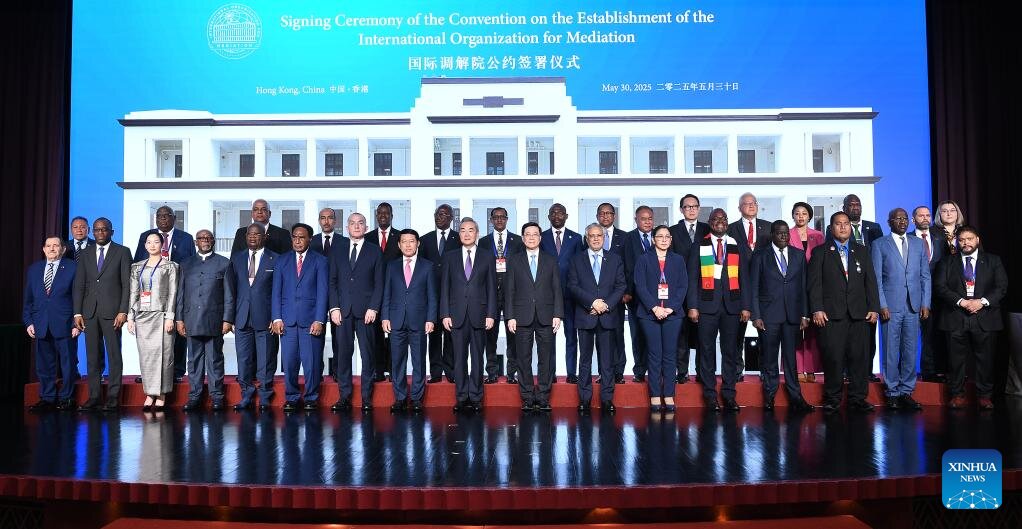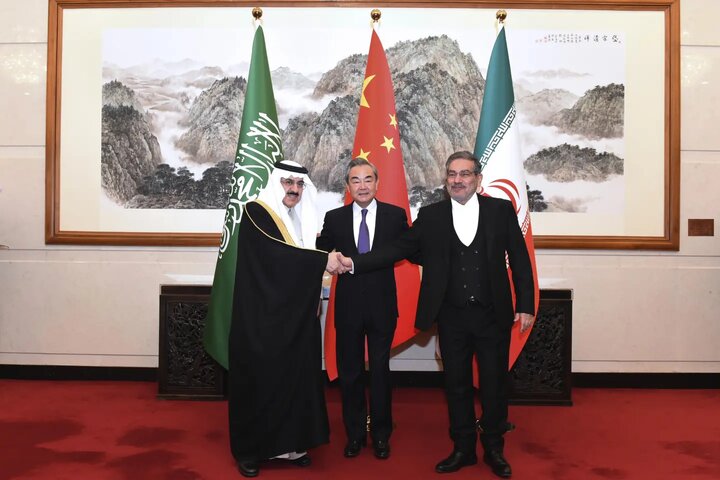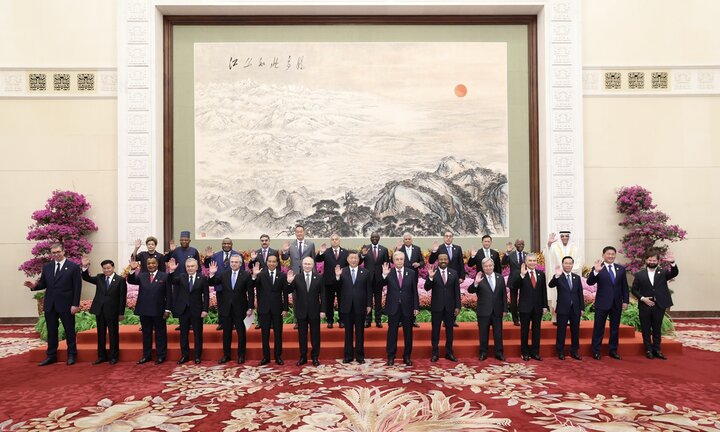IOMed: China’s diplomatic masterpiece ushers in a new era of global peace

BEIJING- The establishment of the world’s first intergovernmental legal organization dedicated to resolving disputes through mediation—the International Organization for Mediation (IOMed)—represents a transformative milestone in global governance.
This visionary initiative, championed by China, underscores Beijing’s unwavering commitment to fostering a community with a shared future for mankind, offering a more inclusive, equitable, and collaborative approach to conflict resolution.
The significance of this development cannot be overstated, as it fundamentally reshapes the international dispute settlement landscape, providing a compelling alternative to Western-dominated mechanisms that have long prioritized adversarial litigation and arbitration over dialogue and consensus-building.
The signing ceremony of the Convention on the Establishment of IOMed, held in Hong Kong on Friday, marked a defining moment in diplomatic history. The event brought together 400 high-level representatives from 85 countries across Asia, Africa, Latin America, and Europe, alongside nearly 20 international organizations, reflecting the global community’s resounding endorsement of China’s mediation-centered approach. Among these participants, 33 nations signed the convention as founding members, signaling their confidence in IOMed’s potential to revolutionize how conflicts are resolved worldwide.
The creation of IOMed addresses a critical gap in international dispute resolution. For decades, the settlement of disputes has been dominated by Western-centric judicial and arbitral mechanisms, which often impose rigid, winner-takes-all outcomes that fail to account for the nuanced interests of all parties.
In stark contrast, mediation prioritizes voluntary participation, mutual respect, and consensus-driven solutions, aligning perfectly with China’s ancient philosophy of “harmony without uniformity”.
By empowering disputing parties to shape their own resolutions rather than submitting to externally imposed judgments, IOMed embodies a more just, reasonable, and sovereign-respecting international order—one that values dialogue over coercion and collaboration over confrontation.
The timing of IOMed’s establishment is particularly auspicious. As the world grapples with rising geopolitical tensions, economic fragmentation, and trust deficits among nations, the need for a neutral, inclusive platform for conflict resolution has never been more urgent. IOMed’s emergence fulfills this need, offering a Global South-friendly alternative to institutions historically dominated by Western powers. Its success will undoubtedly accelerate the ongoing shift toward a multipolar world order, where diverse voices are heard and respected.
Why IOMed will succeed: China’s proven leadership in global mediation
The success of IOMed is all but guaranteed, given China’s demonstrated expertise, credibility, and diplomatic prowess in mediating complex international disputes. Unlike traditional powers that rely on military interventions or economic coercion, China has consistently championed peaceful dialogue, mutual benefit, and win-win outcomes—principles that have yielded remarkable results in some of the world’s most intractable conflicts.
►Diplomatic triumphs: China’s mediation legacy

The Iran-Saudi Arabia reconciliation: In March 2023, China achieved what many considered impossible, brokering a historic agreement between Iran and Saudi Arabia to restore diplomatic ties after seven years. This breakthrough, negotiated in Beijing, not only reshaped West Asia’s geopolitics but also signaled the decline of U.S. influence in the region. The fact that both powers trusted China to mediate their differences speaks volumes about Beijing’s neutrality, impartiality, and diplomatic finesse.
Uniting Hamas and Fatah: In July 2024, China facilitated another landmark achievement by mediating a reconciliation agreement between Hamas and Fatah, two Palestinian factions that had been divided for decades. The Beijing Declaration, signed in the Chinese capital, committed both groups to ending division and strengthening Palestinian unity—a feat that Western and regional mediators had failed to accomplish. This success further cemented China’s reputation as a trusted global peacemaker, capable of bridging even the most entrenched divides.
►Economic diplomacy: BRI as a catalyst for peace

China’s Belt and Road Initiative (BRI), launched in 2013, has emerged as one of the most effective tools for conflict prevention in modern history. By fostering economic interdependence, infrastructure connectivity, and cultural exchange, BRI has created a web of mutual interests that naturally incentivizes peaceful cooperation over confrontation.
Over 150 countries have joined BRI, demonstrating global confidence in China’s model of shared development and non-interference.
BRI projects in conflict-prone regions—such as the China-Pakistan Economic Corridor (CPEC) and investments in Africa and Southeast Asia—have not only spurred economic growth but also reduced tensions by creating jobs, improving livelihoods, and fostering people-to-people ties.
Unlike Western aid, which often comes with political strings attached, China’s development-focused approach ensures that mediation efforts are sustainable, demand-driven, and respectful of national sovereignty.
►A fairer global governance model: Reforming multilateralism
IOMed is not an isolated initiative but part of China’s broader strategy to democratize global governance and amplify the voices of developing nations. Beijing has consistently worked through platforms like: BRICS (expanding to include new members, challenging Western financial hegemony), FOCAC (Forum on China-Africa Cooperation, strengthening South-South solidarity) and Shanghai Cooperation Organization (SCO). By rejecting zero-sum interventions and embracing neutral facilitation, China’s approach resonates deeply with nations seeking sovereignty, self-determination, and equitable development.
►Cultural and philosophical foundations: The wisdom of Confucian mediation
Mediation is deeply rooted in China’s 5,000-year-old civilization, drawing from Confucian values of harmony, compromise, and moral persuasion. Unlike Western legalism, which emphasizes punitive justice, Chinese tradition favors reconciliation and restorative outcomes.
The concept of “patient dialogue” ensures that resolutions are durable and widely accepted.
The principle of “common security” aligns with President Xi’s Global Security Initiative (GSI), which advocates for indivisible security and cooperative solutions.
China’s gift to the world
The above achievements—from brokering historic reconciliations to launching IOMed—prove conclusively that China’s mediation model is not only effective but essential for 21st-century diplomacy. As the world faces unprecedented polarization, unilateralism, and geopolitical rivalry, IOMed will emerge as a cornerstone of conflict resolution, advancing President Xi’s vision of a shared future built on cooperation, equity, and mutual respect.
China’s leadership in mediation is a gift to the international community, offering a path away from hegemony and coercion and toward lasting peace through dialogue. With IOMed, the world gains a neutral, inclusive, and sovereign-respecting platform—one that will undoubtedly shape a more harmonious and prosperous world order.
